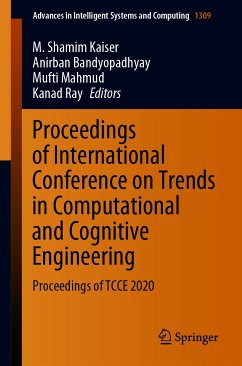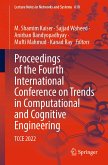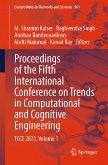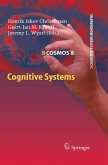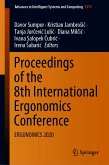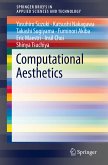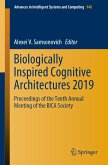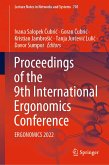Proceedings of International Conference on Trends in Computational and Cognitive Engineering (eBook, PDF)
Proceedings of TCCE 2020
Redaktion: Kaiser, M. Shamim; Ray, Kanad; Mahmud, Mufti; Bandyopadhyay, Anirban
161,95 €
161,95 €
inkl. MwSt.
Sofort per Download lieferbar

81 °P sammeln
161,95 €
Als Download kaufen

161,95 €
inkl. MwSt.
Sofort per Download lieferbar

81 °P sammeln
Jetzt verschenken
Alle Infos zum eBook verschenken
161,95 €
inkl. MwSt.
Sofort per Download lieferbar
Alle Infos zum eBook verschenken

81 °P sammeln
Proceedings of International Conference on Trends in Computational and Cognitive Engineering (eBook, PDF)
Proceedings of TCCE 2020
Redaktion: Kaiser, M. Shamim; Ray, Kanad; Mahmud, Mufti; Bandyopadhyay, Anirban
- Format: PDF
- Merkliste
- Auf die Merkliste
- Bewerten Bewerten
- Teilen
- Produkt teilen
- Produkterinnerung
- Produkterinnerung

Bitte loggen Sie sich zunächst in Ihr Kundenkonto ein oder registrieren Sie sich bei
bücher.de, um das eBook-Abo tolino select nutzen zu können.
Hier können Sie sich einloggen
Hier können Sie sich einloggen
Sie sind bereits eingeloggt. Klicken Sie auf 2. tolino select Abo, um fortzufahren.

Bitte loggen Sie sich zunächst in Ihr Kundenkonto ein oder registrieren Sie sich bei bücher.de, um das eBook-Abo tolino select nutzen zu können.
This book presents various computational and cognitive modeling approaches in the areas of health, education, finance, environment, engineering, commerce, and industry. It is a collection of selected conference papers presented at the International Conference on Trends in Computational and Cognitive Engineering (TCCE 2020). It shares cutting-edge insights and ideas from mathematicians, engineers, scientists, and researchers and discusses fresh perspectives on problem solving in a range of research areas.
- Geräte: PC
- ohne Kopierschutz
- eBook Hilfe
- Größe: 30.86MB
Andere Kunden interessierten sich auch für
![Proceedings of the Fourth International Conference on Trends in Computational and Cognitive Engineering (eBook, PDF) Proceedings of the Fourth International Conference on Trends in Computational and Cognitive Engineering (eBook, PDF)]() Proceedings of the Fourth International Conference on Trends in Computational and Cognitive Engineering (eBook, PDF)193,95 €
Proceedings of the Fourth International Conference on Trends in Computational and Cognitive Engineering (eBook, PDF)193,95 €![Proceedings of the Fifth International Conference on Trends in Computational and Cognitive Engineering (eBook, PDF) Proceedings of the Fifth International Conference on Trends in Computational and Cognitive Engineering (eBook, PDF)]() Proceedings of the Fifth International Conference on Trends in Computational and Cognitive Engineering (eBook, PDF)153,95 €
Proceedings of the Fifth International Conference on Trends in Computational and Cognitive Engineering (eBook, PDF)153,95 €![Cognitive Systems (eBook, PDF) Cognitive Systems (eBook, PDF)]() Cognitive Systems (eBook, PDF)161,95 €
Cognitive Systems (eBook, PDF)161,95 €![Proceedings of the 8th International Ergonomics Conference (eBook, PDF) Proceedings of the 8th International Ergonomics Conference (eBook, PDF)]() Proceedings of the 8th International Ergonomics Conference (eBook, PDF)73,95 €
Proceedings of the 8th International Ergonomics Conference (eBook, PDF)73,95 €![Computational Aesthetics (eBook, PDF) Computational Aesthetics (eBook, PDF)]() Yasuhiro SuzukiComputational Aesthetics (eBook, PDF)40,95 €
Yasuhiro SuzukiComputational Aesthetics (eBook, PDF)40,95 €![Biologically Inspired Cognitive Architectures 2019 (eBook, PDF) Biologically Inspired Cognitive Architectures 2019 (eBook, PDF)]() Biologically Inspired Cognitive Architectures 2019 (eBook, PDF)121,95 €
Biologically Inspired Cognitive Architectures 2019 (eBook, PDF)121,95 €![Proceedings of the 9th International Ergonomics Conference (eBook, PDF) Proceedings of the 9th International Ergonomics Conference (eBook, PDF)]() Proceedings of the 9th International Ergonomics Conference (eBook, PDF)129,95 €
Proceedings of the 9th International Ergonomics Conference (eBook, PDF)129,95 €-
-
-
This book presents various computational and cognitive modeling approaches in the areas of health, education, finance, environment, engineering, commerce, and industry. It is a collection of selected conference papers presented at the International Conference on Trends in Computational and Cognitive Engineering (TCCE 2020). It shares cutting-edge insights and ideas from mathematicians, engineers, scientists, and researchers and discusses fresh perspectives on problem solving in a range of research areas.
Dieser Download kann aus rechtlichen Gründen nur mit Rechnungsadresse in A, B, BG, CY, CZ, D, DK, EW, E, FIN, F, GR, HR, H, IRL, I, LT, L, LR, M, NL, PL, P, R, S, SLO, SK ausgeliefert werden.
Produktdetails
- Produktdetails
- Verlag: Springer Nature Singapore
- Seitenzahl: 723
- Erscheinungstermin: 16. Dezember 2020
- Englisch
- ISBN-13: 9789813346734
- Artikelnr.: 60766520
- Verlag: Springer Nature Singapore
- Seitenzahl: 723
- Erscheinungstermin: 16. Dezember 2020
- Englisch
- ISBN-13: 9789813346734
- Artikelnr.: 60766520
- Herstellerkennzeichnung Die Herstellerinformationen sind derzeit nicht verfügbar.
Dr. M Shamim Kaiser is currently working as Professor at the Institute of Information Technology of Jahangirnagar University, Savar, Dhaka-1342, Bangladesh. He received his Bachelor's and Master's degrees in Applied Physics Electronics and Communication Engineering from the University of Dhaka, Bangladesh, in 2002 and 2004, respectively, and the Ph.D. degree in Telecommunication Engineering from the Asian Institute of Technology, Thailand, in 2010. His current research interests include data analytics, machine learning, wireless network & signal processing, cognitive radio network, big data and cyber security, and renewable energy. He has authored more than 100 papers in different peer-reviewed journals and conferences. He is Associate Editor of the IEEE Access Journal, and Guest Editor of Brain Informatics Journal, and Cognitive Computation Journal. Dr. Kaiser is a life member of Bangladesh Electronic Society; BangladeshPhysical Society. He is also a senior member of IEEE, USA, and IEICE, Japan, and an active volunteer of the IEEE Bangladesh Section. He is Founding Chapter Chair of the IEEE Bangladesh Section Computer Society Chapter. Dr. Kaiser organized various international conferences such as ICEEICT 2015-2018, IEEE HTC 2017, IEEE ICREST 2018, and BI2020 Anirban Bandyopadhyay is Senior Scientist in the National Institute for Materials Science (NIMS), Tsukuba, Japan., and completed his Ph.D. from Indian Association for the Cultivation of Science (IACS), Kolkata 2005, December, on supramolecular electronics. During 2005-2007:, he has been ICYS Research Fellow NIMS, Japan, and from 2007 to now, he is Permanent Scientist in NIMS, Japan. He has 10 patents on building artificial organic brain, big data, molecular bot, cancer Alzheimer drug, fourth circuit element, etc. During 2013-2014, he has been Visiting Scientist in MIT, USA, on biorhythms. He is World Technology Network (WTN) Fellow, (2009-continued); he has been awarded Hitachi Science and Technology Award 2010, Inamori Foundation Award 2011-2012, Kurata Foundation Award, and SSI Gold medal (2017)., He is Inamori Foundation Fellow (2011-), and Sewa Society International SSS Fellow (2012-), Japan Dr. Mufti Mahmud is Senior Lecturer of Computing at the Nottingham Trent University, UK. He received Ph.D. degree in Information Engineering from the University of Padova - Italy, in 2011. A recipient of the Marie-Curie postdoctoral fellowship, he served at various positions in the industry and academia in India, Bangladesh, Italy, Belgium, and the UK since 2003. An expert in computational intelligence, data analysis, and big data technologies, Dr. Mahmud has published over 80 peer-reviewed articles and papers in leading journals and conferences. Dr. Mahmud serves as Associate Editor to the Cognitive Computation, IEEE Access, Big Data Analytics, and Brain Informatics journals. Dr. Mahmud is a senior member of IEEE and ACM, a professional member of the British Computer Society, and Fellow of the higher education academy - UK. During the year 2020-2021, he is serving as Vice Chair of the Intelligent System Application Technical Committee of IEEE CIS, a member of the IEEE CIS Task Force on Intelligence Systems for Health and the IEEE R8 Humanitarian Activities Subcommittee, and Project Liaison Officer of the IEEE UK and Ireland SIGHT committee. Dr. Mahmud is also serving as Local Organizing Chair of IEEE-WCCI2020; General Chair of BI2020 and BI2021; and Program Chair of IEEE-CICARE2020. Kanad Ray senior member, IEEE) received the M.Sc. degree in physics from Calcutta University and the Ph.D. degree in physics from Jadavpur University, West Bengal, India. He has been Professor of Physics and Electronics and Communication, and is presently working as Head of the Department of Physics, Amity School of Applied Sciences, Amity University Rajasthan (AUR), Jaipur, India. His current research areas of interest include cognition, communication, electromagnetic field theory, antenna and wave propagation, microwave, computational biology, and applied physics. He has been serving as Editor for various Springer book series. He was Associate Editor of the Journal of Integrative Neuroscience (The Netherlands: IOS Press). He has been Visiting Professor to UTM & UTeM, Malaysia, and Visiting Scientist to NIMS, Japan. He has established MOU with UTeM Malaysia, NIMS Japan, and the University of Montreal, Canada.He has visited several countries such as Netherlands, Turkey, China, Czechoslovakia, Russia, Portugal, Finland, Belgium, South Africa, Japan, Singapore, Thailand, and Malaysia for various academic missions. He has organized various conferences such as SoCPROS, SoCTA, ICOEVCI, and TCCE as General Chair and a steering committee member.
Chapter 1. Bangla Real-Word Error Detection and Correction Using Bidirectional LSTM and Bigram Hybrid Model.- Chapter 2. Quantitative Analysis of Deep CNNs for Multilingual Handwritten Digit Recognition.- Chapter 3. Performance Analysis of Machine Learning Approaches in SoftwareComplexity Prediction.- Chapter 4. Bengali Abstractive News Summarization (BANS): A Neural Attention Approach.- Chapter 5. Application of Feature Engineering with Classification Techniques toEnhance Corporate Tax Default Detection Performance.- Chapter 6. PRCMLA: Product Review Classification using Machine Learning Algorithms.- Chapter 7. Handwritten Bangla Character Recognition Using Deep Convolutional Neural Network: Comprehensive Analysis on Three Complete Datasets.- Chapter 8. Handwritten Bangla Character Recognition Using ConvolutionalNeural Network and Bidirectional Long Short-Term Memory.- Chapter 9. Bangla Text Generation Using Bidirectional Optimized Gated Recurrent Unit Network.- Chapter 10. An ANN-based Approach to Identify Smart Appliances for Ambient Assisted Living (AAL) in the Smart Space.
Chapter 1. Bangla Real-Word Error Detection and Correction Using Bidirectional LSTM and Bigram Hybrid Model.- Chapter 2. Quantitative Analysis of Deep CNNs for Multilingual Handwritten Digit Recognition.- Chapter 3. Performance Analysis of Machine Learning Approaches in SoftwareComplexity Prediction.- Chapter 4. Bengali Abstractive News Summarization (BANS): A Neural Attention Approach.- Chapter 5. Application of Feature Engineering with Classification Techniques toEnhance Corporate Tax Default Detection Performance.- Chapter 6. PRCMLA: Product Review Classification using Machine Learning Algorithms.- Chapter 7. Handwritten Bangla Character Recognition Using Deep Convolutional Neural Network: Comprehensive Analysis on Three Complete Datasets.- Chapter 8. Handwritten Bangla Character Recognition Using ConvolutionalNeural Network and Bidirectional Long Short-Term Memory.- Chapter 9. Bangla Text Generation Using Bidirectional Optimized Gated Recurrent Unit Network.- Chapter 10. An ANN-based Approach to Identify Smart Appliances for Ambient Assisted Living (AAL) in the Smart Space.
